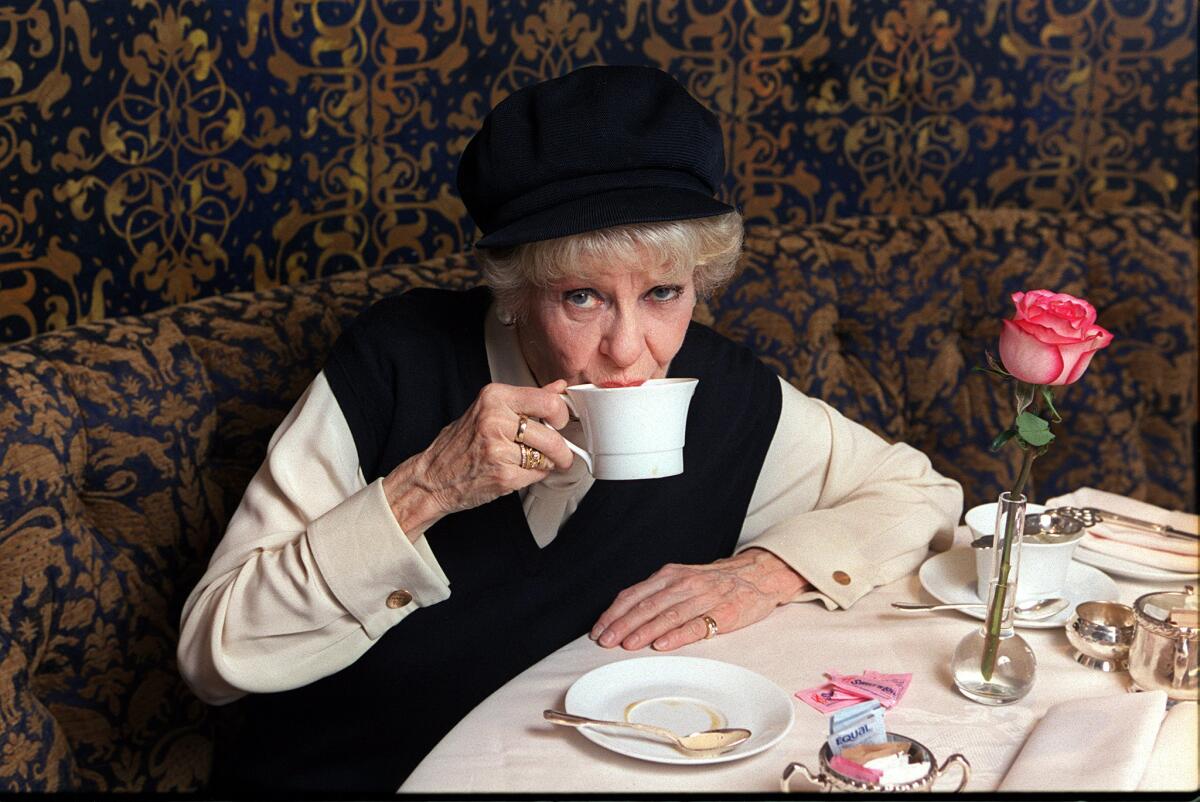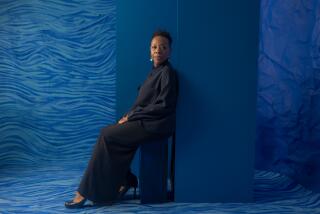Elaine Stritch’s originality blazed fiercely on Broadway

- Share via
After the lights are dimmed on Broadway in honor of Elaine Stritch, who died Thursday at 89, I’m not sure that they’ll ever burn quite as fiercely again.
Stritch wasn’t just a legend on the Great White Way — she was the wisecracking, lovably irascible, emotionally naked incarnation of the American theater’s postwar golden age.
A singular musical comedy sensation, she didn’t need punch lines to ignite conflagrations of laughter. If anger is the root of comedy, her slow burn was hilariously nuclear. Simply by turning her head, she could communicate a level of violent exasperation not seen since Sophocles’ Electra first told her mother how she really felt about her.
The only difference was that Stritch’s fury was at once comic and tragic. “I think humor is one of the most precious things you can have,” she said to Mel Gussow in his biography of the playwright Edward Albee. “I also think it’s dangerous, because you can get away with so much through using it.”
Stritch wasn’t born with the most classically beautiful voice, but she could do miraculously jazzy things with her sandpapery sound. And her ability to infuse lyrics with biting wit or sneaky pathos or, better yet, both at the same time, was unrivaled. No one acted a song better — not even the great Barbara Cook. (To have heard her as an octogenarian interpret “I Feel Pretty” from “West Side Story” was a lesson in the eternal vibrancy of her art.)
Hal Prince, who directed Stritch in two of her biggest triumphs, the original 1970 Broadway production of Stephen Sondheim and George Furth’s “Company” and the 1994 revival of “Show Boat,” described her voice to me as a “personality voice,” a category in which he included such singers as Ethel Merman, Mary Martin and Carol Channing.
“Once you’ve heard one of them introduce a song,” Prince said, “you can never hear it sung by anyone else again.”
Of course it was only natural that Stritch would “nail” “The Ladies Who Lunch,” her big number from “Company” that became her signature song. Sondheim wrote it expressly for her.
In “Finishing the Hat,” the first of his two-volume set of collected lyrics, Sondheim recalled, “The character of Joanne was not only written for Elaine Stritch, it was based on her, or at least on her acerbic delivery of self-assessment, as exemplified by a moment George Furth had shared with her: they had entered a bar at two in the morning and Elaine, well-oiled, had murmured to the bartender in passing, “Just give me a bottle of vodka and a floor plan.”
Stritch’s battle with the bottle became part of the legend. One of her greatest Broadway performances was in the role of alcoholic truth-teller Claire in the 1996 revival of Albee’s “A Delicate Balance,” directed by Gerald Gutierrez. Rather than playing a theatrical stereotype of a drunk, Stritch dug deep into Albee’s drama and gave us a woman who stared into her drink when talking about her bad luck with men. It was a portrait of someone drowning in solitude while surrounded by the background noise of her sister’s family and the existential terror shared by all.
Stritch revealed her struggle with alcoholism in her Tony-winning solo show, “Elaine Stritch at Liberty,” which she co-wrote with John Lahr. This play with musical interludes gave her the role she had been waiting a lifetime to play — that of the one and only Elaine Stritch.
There were many crackling anecdotes from her inebriated days (my favorite: her report of Judy Garland saying to her after an all-night binge together, “Elaine, I never thought I’d say this. But good night!”). But she didn’t whitewash the misery or the fact that it nearly took her life.
“It almost all happened without me,” she said without self-pity in her show.
When I interviewed her at the Carlyle, the New York hotel that she long called home, just before “At Liberty” came to L.A., she was performing the role of Elaine Stritch to the rafters. Barking orders to the photographer and waiter, throwing her fur coat on a banquette then wondering why no one had bothered to pick it up, she was as difficult as she was reputed to be, but captivatingly so for the most part and she could make a genuine connection.
As I was leaving, she said to me that she had the feeling that I was a “real writer” (“do you ever get that feeling about someone?”) and that she trusted me.
Talk about instant self-esteem for a journalist still operating under the radar.
I never forgot that kindness or the way she talked about sharing the stage with the magnificent Kim Stanley in “Bus Stop” and being transfixed by her at every performance. She never grew tired of listening to her brilliant co-star, and it was through that active, attentive listening that she earned the first of her several Tony nominations.
Stritch, who studied acting alongside Marlon Brando at the New School, who understudied the famously never-absent Ethel Merman in “Call Me Madam” and who became a signal interpreter of songs by Noel Coward and Sondheim, picked up lessons from the theatrical titans she crossed paths with in her storied career. They in turn recognized her as a fellow original.
To the question, “Why did you want to become an actress?” Stritch answered in Eddie Shapiro’s “Nothing Like a Dame” that she “wanted higher ceilings.” Which only makes sense when you consider her ability to blow the roof off any house she played.
More to Read
The biggest entertainment stories
Get our big stories about Hollywood, film, television, music, arts, culture and more right in your inbox as soon as they publish.
You may occasionally receive promotional content from the Los Angeles Times.











